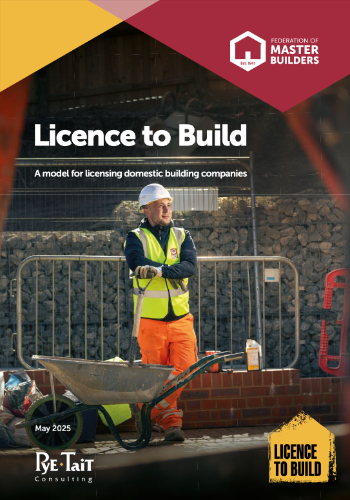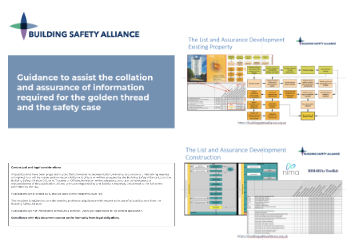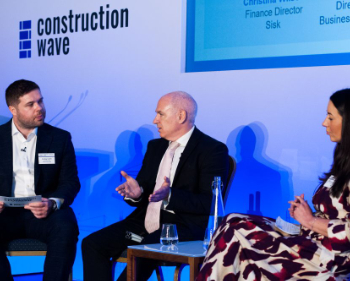Mental health support on the rise but workers still struggling, CIOB report shows
The number of mental health support services available to construction workers has drastically increased, research from the Chartered Institute of Building (CIOB) shows.
Data from a new report, called Understanding Mental Health in the Built Environment 2025, revealed more than three-quarters of workers* had been encouraged to get involved in support events like Mental Health Awareness Week, which runs throughout this week (W/C 12 May 2025), and more than half of people surveyed said they had access to a mental health first aider at work if they need help.
Despite the positives however, there remains an alarming amount of people struggling with their mental health working within the industry, including the 28 per cent of survey respondents who revealed they have experienced suicidal thoughts in the past year. Nearly one in five (17 per cent) also revealed they do not have the confidence to approach a colleague they think might be struggling.
Daisie Barnett, policy development manager at CIOB and author of the report, said: “This survey follows a similar report CIOB published in 2020, just before the Covid-19 pandemic. We were interested to see how the industry has responded, particularly in the wake of the pandemic and the data gives us mixed results.
“We know working in construction is not without its physical and mental challenges, so it is incredibly encouraging to see the increase in support available to the workforce. Fifty-four per cent of people we spoke to told us they have mental health first aiders available at their place of work, up from 35 per cent in 2020, more than a third (35 per cent) said they now have scheduled 1:1 meetings with their managers and 77 per cent have been encouraged to get involved with awareness events.”
Worryingly however, there remains a significant number of people working in the industry living through mental ill-health, including high levels of anxiety, fatigue and thoughts about suicide.
“Looking at the data, nearly one in four people (24 per cent) working in the industry have experienced stress daily over the past year,” Barnett continued.
“Twenty per cent of those we spoke to have experienced daily fatigue, most likely due to long working hours to meet looming deadlines, and more than a quarter have felt suicidal at least once over the past year.
“In an ideal world, nobody working in the industry would experience any mental wellbeing concerns at all. While that vision might be slightly unrealistic, CIOB believes there is still far more the industry and government can do to support the people working in the construction sector.”
CIOB has made a series of recommendations, challenging companies to commit to achieving better mental health outcomes.
Barnett added: “Clearly, there is more work to do, and our report sets out some excellent starting points for both businesses and the government to consider.
“Firstly, we would like to see more company leaders commit their business to the Mental Health at Work Commitment, which is a simple framework that builds off the Thriving at Work standards.
“More companies need to mandate monthly 1-1 check-in meetings between managers and their direct reports that focus on mental wellbeing, fatigue management plans, andinduction processes that promote integration and the importance of wellbeing to new staff.
“Managers need better training in identifying and managing poor mental health. Even for micro businesses, there are free webinars online to help people better equip themselves with an understanding of mental health issues.”
Recommendations to the UK Government include reducing the financial stress on small businesses by reviewing the Fair payment Code and considering whether this should be made mandatory for large contractors to stick to.
CIOB has also called for an update to the Suicide Prevention Strategy for England drawing experience from Australia’s successful strategy, and targets to be put in place to measure its progress. It has also recommended Government ensures its Men’s Health Strategy has sufficient focus on mental health in high-risk sectors such as construction to ensure initiatives are appropriate and achieves the outcomes intended.
CIOB’s report has been backed by Mates in Mind, a leading charity addressing the stigma surrounding mental ill-health. Sam Downie, Managing Director, said: “We know that training is a crucial step in building positive mental health in and through work, in order to embed a proactive culture of prevention.
“Educating all employees and workers across your supply chain to spot the signs of mental ill-health, have the confidence to start a conversation about it and be able to signpost further support, is crucial. It is through normalising conversations about mental health, that we are able to address the stigma that surrounds it, and it is education, and practice of course, that gives people the confidence to start those important conversations.
“In addition, for those in management positions, it is also important to know how and when to assess and mitigate the risk of stress. Even though employers have a legal duty of care to protect workers from stress at work by doing a risk assessment and acting on it, almost 70 per cent of respondents in our survey, said that their line managers would not know how to undertake stress risk assessments or understand when they may be necessary.”
Free resources to support individuals struggling with their mental wellbeing can be found at: www.samaritans.org or by calling the NHS by dialling 111 (UK only). The CIOB Assist fund exists to help members who may be experiencing mental health difficulties and signposts a variety of accessible materials.
This article appears on the CIOB news and blog site as 'Mental health support on the rise but workers still struggling, CIOB report shows' dated 12 May, 2025.
--CIOB
[edit] Related articles on Designing Buildings
- 37% of SMEs suffer mental health problems due to pay issues
- Building up wellbeing in construction.
- Changing attitudes towards the mental wellbeing of early career Architectural Technology professionals.
- CIOB launches global mental health survey.
- CIOB responds to CITB mental health and wellbeing report.
- Construction Health and Safety Group CHSG.
- Construction leadership for mental health.
- COVID-19 and mental health within construction firms.
- Economic upturn masks mental health crisis in 2021.
- Emotional distress
- Empowering the construction industry to take action on mental health
- Heritage and mental health.
- Mental health and wellbeing
- Mental health awareness week
- Mental health first aid
- Mental health in the construction industry.
- Psychosocial disability
- Stop Make a Change SMAC-20.
- Tackling mental health issues in construction.
- Tackling mental health issues in construction
- Tackling mental health - 6 point plan
- Understanding and managing workplace stress is critically important to civil engineers.
- Understanding mental health in the built environment.
- World mental health day.
Featured articles and news
International Electrician Day, 10 June 2025
Celebrating the role of electrical engineers from André-Marie Amperè, today and for the future.
New guide for clients launched at Houses of Parliament
'There has never been a more important time for clients to step up and ...ask the right questions'
The impact of recycled slate tiles
Innovation across the decades.
EPC changes for existing buildings
Changes and their context as the new RdSAP methodology comes into use from 15 June.
Skills England publishes Sector skills needs assessments
Priority areas relating to the built environment highlighted and described in brief.
BSRIA HVAC Market Watch - May 2025 Edition
Heat Pump Market Outlook: Policy, Performance & Refrigerant Trends for 2025–2028.
Committing to EDI in construction with CIOB
Built Environment professional bodies deepen commitment to EDI with two new signatories: CIAT and CICES.
Government Grenfell progress report at a glance
Line by line recomendation overview, with links to more details.
An engaging and lively review of his professional life.
Sustainable heating for listed buildings
A problem that needs to be approached intelligently.
50th Golden anniversary ECA Edmundson apprentice award
Deadline for entries has been extended to Friday 27 June, so don't miss out!
CIAT at the London Festival of Architecture
Designing for Everyone: Breaking Barriers in Inclusive Architecture.
Mixed reactions to apprenticeship and skills reform 2025
A 'welcome shift' for some and a 'backwards step' for others.
Licensing construction in the UK
As the latest report and proposal to licence builders reaches Parliament.
Building Safety Alliance golden thread guidance
Extensive excel checklist of information with guidance document freely accessible.
Fair Payment Code and other payment initiatives
For fair and late payments, need to work together to add value.
Pre-planning delivery programmes and delay penalties
Proposed for housebuilders in government reform: Speeding Up Build Out.
High street health: converting a building for healthcare uses
The benefits of health centres acting as new anchor sites in the high street.


























